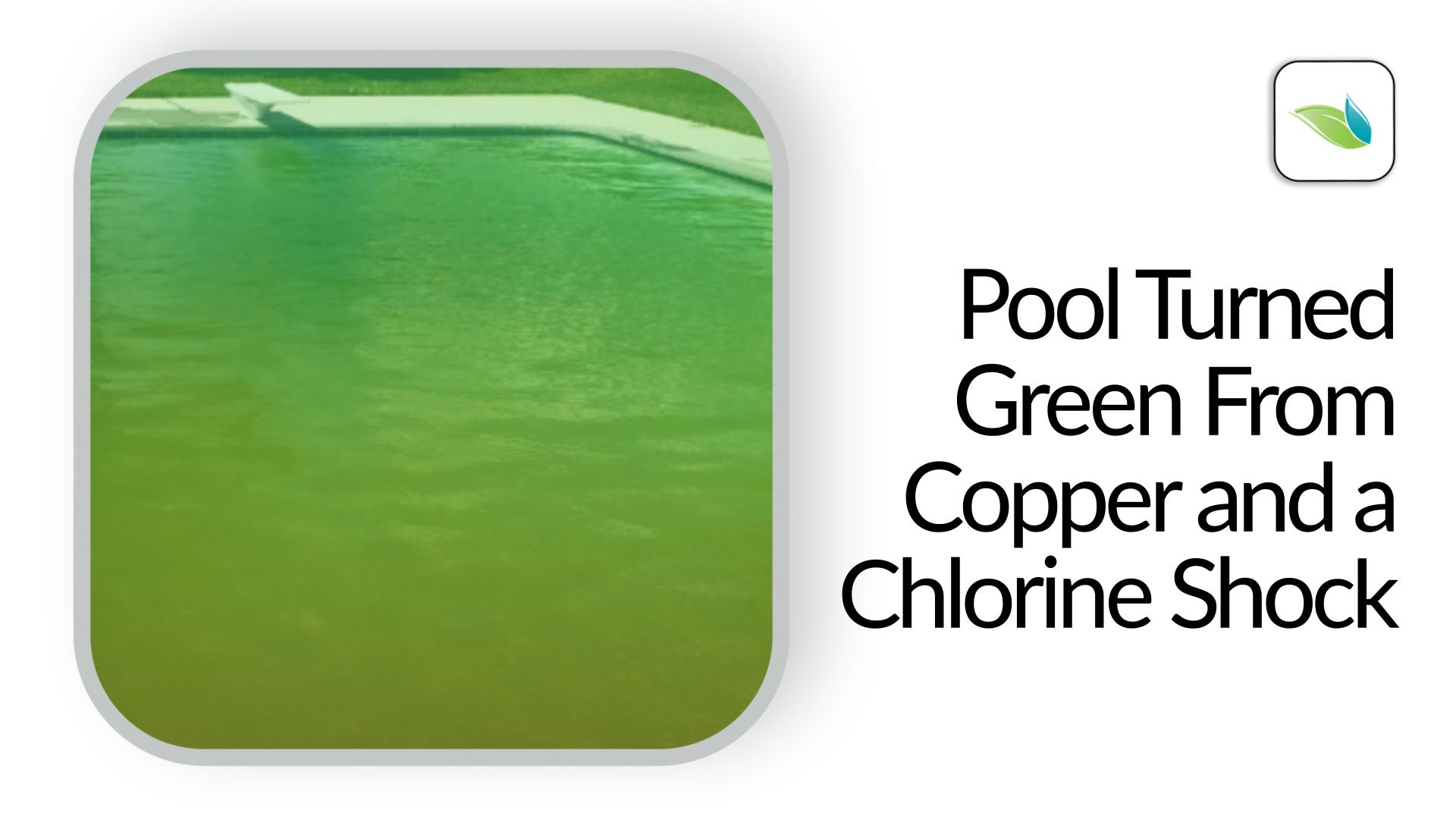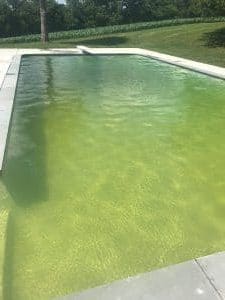To remove copper from pool water, use a metal sequestrant product and maintain proper pH levels. Copper can cause discoloration in pool water due to metal stains.
When dealing with this issue, the key is to prevent copper buildup and regularly test and balance the water chemistry. Copper contamination in pool water can be a common problem that often results in unsightly stains and discoloration. It is important to address this issue promptly to maintain the aesthetic appeal of your pool.
By following some simple steps and using the right products, you can effectively get rid of copper in your pool water and prevent future staining. We will explore various methods and techniques to help you tackle the problem of copper contamination in your pool and keep your pool water looking crystal clear.

Credit: blog.orendatech.com
Understanding Copper In Pool Water
Coping with copper in pool water can be a challenge, but the key is to address the root cause. Testing the water for copper levels is crucial, and using a copper sequestrant can effectively eliminate the issue. Regular maintenance and proper chemical balance will help keep copper at bay, ensuring a clear and pristine pool environment.
Sources Of Copper Contamination
Copper is a common contaminant in pool water and can enter your pool from various sources. Understanding these sources can help you effectively address the issue and maintain a clean and safe swimming environment.
One of the primary sources of copper contamination is the pool equipment itself. Over time, the metal parts of your pool equipment, such as pipes, fittings, and heaters, can corrode and release copper ions into the water. Additionally, if your pool has a copper-based heat exchanger, it is highly likely that copper levels will be elevated.
Another significant source of copper in pool water is from the use of algaecides and other chemical treatments. Many algaecides contain copper compounds as active ingredients, which are effective in killing algae. However, if used excessively or incorrectly, these treatments can lead to copper buildup in the water. It is crucial to follow product instructions and avoid overusing these types of chemicals.
Furthermore, copper can also enter the pool from external sources, such as using well water or water from a source with high copper content. Even the copper pipes used for filling your pool can introduce copper ions into the water. Therefore, ensuring the quality of the water you use to fill your pool is essential to prevent copper contamination.
Effects Of Copper On Pool Water
Copper contamination in pool water can have several detrimental effects on the water quality as well as on swimmers’ comfort. Understanding these effects will help you effectively address copper issues in your pool.
One of the noticeable effects of high copper levels is a change in water color. Excessive copper can turn your pool water cloudy or give it a blue or green tint, which can be quite unappealing and off-putting.
Moreover, copper can also cause staining on pool surfaces, such as the walls, floor, and even on swimmer’s hair and swimsuits. These stains can be difficult to remove and can result in the deterioration of the pool’s aesthetics.
Another significant effect of copper contamination is its impact on swimmers’ health and comfort. Copper can cause skin irritation and eye redness, making the swimming experience less enjoyable. Additionally, individuals with copper allergies may experience more severe symptoms, including rashes and itching.
Furthermore, copper can interfere with the effectiveness of other pool chemicals, such as chlorine. High copper levels can reduce chlorine’s disinfecting capabilities, leading to the growth of bacteria and algae in the pool.
Understanding the sources of copper contamination as well as its effects is crucial in effectively managing pool water quality. By addressing these issues promptly, you can maintain a crystal clear pool that provides a safe and enjoyable swimming experience for everyone.
Credit: m.youtube.com
Testing For Copper In Pool Water
Using Test Strips
Test strips are a quick and easy way to check for copper levels in your pool water.
- Obtain a copper test strip designed for pool water testing.
- Follow the manufacturer’s instructions for using the test strip.
- Dip the test strip into the water and wait for the specified time.
- Compare the color of the test strip to the color chart provided to determine copper levels.
Professional Testing
If you prefer a more accurate assessment, consider professional testing options.
- Contact a pool maintenance professional for assistance.
- Collect a sample of your pool water in a clean container.
- Bring the water sample to a pool store or professional laboratory for analysis.
- Receive detailed results and recommendations based on the professional testing.
Removing Copper From Pool Water
Chelating Agents
Chelating agents are chemicals designed to bind copper ions in your pool water, preventing staining and discoloration.
Using A Metal Sequestrant
A metal sequestrant is an effective treatment for removing copper from your pool, preventing undesirable discoloration.

Credit: blog.orendatech.com
Preventing Copper Buildup
Preventing copper buildup in pool water is essential to maintain its cleanliness and safety. Discover effective methods to get rid of copper, ensuring a healthy swimming environment for everyone.
Copper buildup in pool water can cause various problems such as staining, cloudy water, and even skin irritation. To avoid these issues, it is essential to take preventive measures to keep your pool water free from excessive copper levels.
Regular Maintenance
Regular maintenance is key to preventing copper buildup in your pool water. By following a consistent maintenance routine, you can ensure that copper levels remain within the desired range. Here are some steps to incorporate into your regular pool maintenance:
- Test your pool water regularly using a reliable test kit to monitor copper levels. This will help you identify any problems early on.
- Keep your pool clean by regularly skimming leaves and debris from the surface and vacuuming the bottom to minimize the introduction of copper-containing contaminants.
- Regularly clean your pool filter to prevent clogs that can lead to copper buildup in the water.
- Ensure your pool pump is functioning correctly and running for an adequate amount of time to maintain proper filtration and circulation.
- Regularly shock your pool to eliminate any organic matter that can react with copper and cause it to precipitate out of the water.
Water Balance
Maintaining proper water balance is critical in preventing copper buildup. Here are some factors to consider:
- Monitor the pH levels of your pool water regularly. High or low pH levels can promote the corrosion of copper pipes and fittings, leading to increased copper levels.
- Keep the total alkalinity in the recommended range to ensure the stability of the water chemistry and prevent copper corrosion.
- Monitor calcium hardness levels as high levels can contribute to scaling, which can trap copper particles and lead to buildup.
- Use a sequestering agent to help prevent copper from oxidizing and precipitating out of the water.
By following these maintenance and water balance practices, you can significantly reduce the risk of copper buildup in your pool water. Remember to test and monitor regularly to catch any issues early on, ensuring your pool stays clean, clear, and copper-free.
Seeking Professional Help
Seeking professional help for copper removal in pool water is essential when traditional DIY methods fail to eliminate the copper buildup. Pool owners often encounter stubborn copper issues that require expertise and specialized equipment. Here’s why and how to seek professional assistance for effectively addressing copper contamination in your pool.
When To Consult A Pool Expert
Identifying the need for a pool expert’s intervention is critical when the copper levels in your pool water continue to persist despite your efforts. If you notice persistent staining or the water takes on a greenish hue even after attempting to remove the copper using home remedies, it’s time to consult a pool expert.
Professional Copper Removal Services
Professional pool service providers offer specialized copper removal services to alleviate the issue efficiently. They possess the expertise to assess the extent of copper contamination and employ targeted solutions to restore the water’s quality. These professionals utilize advanced filtration systems, ionization, and chelating agents to effectively eliminate copper from the pool water, ensuring a clean and safe swimming environment for you and your family.
Frequently Asked Questions For How To Get Rid Of Copper In Pool Water
What Is The Best Copper Remover For Pools?
The best copper remover for pools is a chelating agent designed to bind and eliminate copper ions effectively.
Does Shocking Pool Remove Copper?
Shocking the pool can remove copper through oxidation reactions with the shocking agent. It helps clear out contaminants.
How Do I Get Copper Out Of My Pool Water?
To remove copper from your pool water, use a copper sequestrant or metal remover that can bind with the copper particles and remove them from the water. Be sure to follow the instructions on the product label for proper dosage and application.
What Causes Too Much Copper In Pool Water?
Excessive copper in pool water is usually caused by the use of copper-based algaecides or from copper pipes and fittings. It can also result from using copper ionization systems. Regular testing and proper maintenance can help prevent high copper levels.
Conclusion
To effectively combat copper in pool water, it is crucial to follow these simple yet effective methods. Regularly test and balance the pool’s pH levels, as well as maintain proper chlorine levels. Utilize a metal sequestrant to prevent copper buildup and consider using a copper-sensing system.
With consistent monitoring and proper maintenance, you can ensure your pool remains copper-free, providing a safe and enjoyable swimming experience for all.
